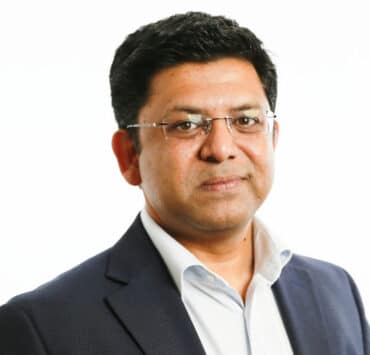|
Getting your Trinity Audio player ready... |
Browse the Instagram account of Charmel Maynard, and you’ll quickly notice a theme emerging. The feed isn’t filled with pictures of cats and food but is instead full of notices about his speaking engagements and virtual coffee hours. Students and community members are invited to join Maynard, University of Miami (UM)’s chief investment officer (CIO) and treasurer, at a Delta Sigma Theta event, meet him at a local Big Brothers Big Sisters chapter, or tune in to a CIO Conversations podcast episode.
Maynard is leveraging his status as one of the youngest university CIOs in the nation to accomplish two big goals—he wants to build a world-class investments office and find unique ways to help UM’s students thrive.
The inaugural edition of “Coffee with Charmel” covered the importance of mentorship as a minority in corporate America. Maynard tries to connect university students with mentors because he knows firsthand how powerful those relationships can be.
Maynard grew up splitting time between Trinidad and Georgia before attending prep school and studying political science at Amherst College. He landed an internship at JPMorgan Chase with an offer to return full time upon graduation. Maynard excelled as a student, but he noticed something different when he returned to the firm as a professional.
“I was surrounded by excellent people, and it was hard to stand out because everyone there was a motivated, competitive, hard-working person from the top of their class,” he recalls. Maynard needed someone to help him navigate the professional world, avoid proverbial landmines, and unlock new opportunities.
Maynard found that person in a senior partner who became his personal mentor. After they bonded over sports and Maynard’s borderline obsession with LeBron James, Maynard was invited to attend leadership meetings, participate in important deals, and even play on the corporate basketball team.
“If you look around the industry, you don’t see many people like me in the top investment role at a university. That motivates me to succeed so we can create more opportunities for people of color and other minorities.”
Charmel Maynard
Soon, Maynard was thriving in his role. “I still preach the value of mentoring because it was of incredible importance in my own career,” he says. “The mentor-protégé relationship is crucial for anyone starting out in corporate America.”
When Maynard’s mentor left JPMorgan for the treasury role at UM, Maynard followed. A year later, that mentor left and recommended someone else for the job—Maynard. At just thirty-two years old, he was managing capital structures and investments totaling $6 billion.
It’s a big job for anyone, but Maynard felt extra pressure as a young Black man. “If you look around the industry, you don’t see many people like me in the top investment role at a university,” he says. “That motivates me to succeed so we can create more opportunities for people of color and other minorities.”
To do so, Maynard had to perform and learn to interact with deans, boards, and investment committees, which are often filled with veteran leaders who have been making shrewd financial deals for decades. Maynard relied on friends, mentors, and counterparts to support, encourage, and equip him as he stepped into the role.
“Young leaders feel like they have to pretend like they know everything,” he says. “I will never know everything, but I learn as I go and ask questions every day so I’m always getting better at my job.”
Maynard has two main responsibilities. He manages the university’s capital structure and invests its assets. In doing so, he found an opportunity to turn his young age into an asset. Today’s venture capital industry is led by dynamic fund managers, many of whom are millennials. Maynard formed essential relationships with these new industry leaders and diversified UM’s portfolio.
In early 2020, the university rewarded Maynard’s performance by adding the title of chief investment officer to his role. Although Maynard was already performing the duties, the official recognition formalizes his appointment and gives him the credibility to move forward in creating an elite investments office and treasury team that will fund scholarships, university projects, and other important endeavors.
As he executes the vision, Maynard has his eye on increasing diversity. He’s already completed a holistic review and revamped the university’s strategy by overturning 80 percent of its assets. After social justice issues took center stage in 2020, UM’s Investments Committee set a specific goal of more than doubling the amount of minority owned funds in its portfolio by the end of fiscal year 2022.
It’s not hard for Maynard to see the impact of his work; all he has to do is look out his office window. He can see the new about $200 million residential village and a $40 million indoor practice facility his office helped finance. He also recognizes many of the students he’s helped develop soft skills or connect to internships and job opportunities.
Now, Maynard is focused on fortifying UM’s balance sheet and ensuring the university has access to liquidity to navigate the COVID-19 era. His work is making a difference. Since he took over the role in 2017, UM’s endowment has grown by 65 percent. At 33.6 percent, its most recent one-year investment return was the best in university history. Those proceeds go back to the university to fund professorships, scholarships, research, and capital projects.
Maynard has made an impact and built the foundation of a program that will impact students and staff for generations to come—and he’s done it all before his fortieth birthday.
Landed
Although Charmel Maynard is making a difference at one of the nation’s leading private research universities, he’s always looking for new opportunities to give back and create opportunities for people of color.
In 2021, he joined Landed’s board of directors. The fintech company based in San Francisco is on a mission to address wage inequality through home ownership. Maynard provides strategic advice to the group as it partners with teachers, nurses, and others to provide down payment assistance so essential workers living in some of the nation’s most expensive housing markets can realize the goal of home ownership.
Thoughts from Guest Editor Susan Pikitch
“Charmel Maynard demonstrates the importance of the mentor-protégé relationship. He had an influential mentor early on who provided advice and advocacy, both personally and professionally; someone who validated his talent and brought him into important deals and meetings that might have been otherwise closed to him. What I really admire is that he is giving back, mentoring students, and stressing the importance of diversity in money management, as well as the need to focus on social responsibility in investing.”
Read features from the Issue 4 2021 Finance section, which include commentary from Guest Editor Susan Pikitch.

